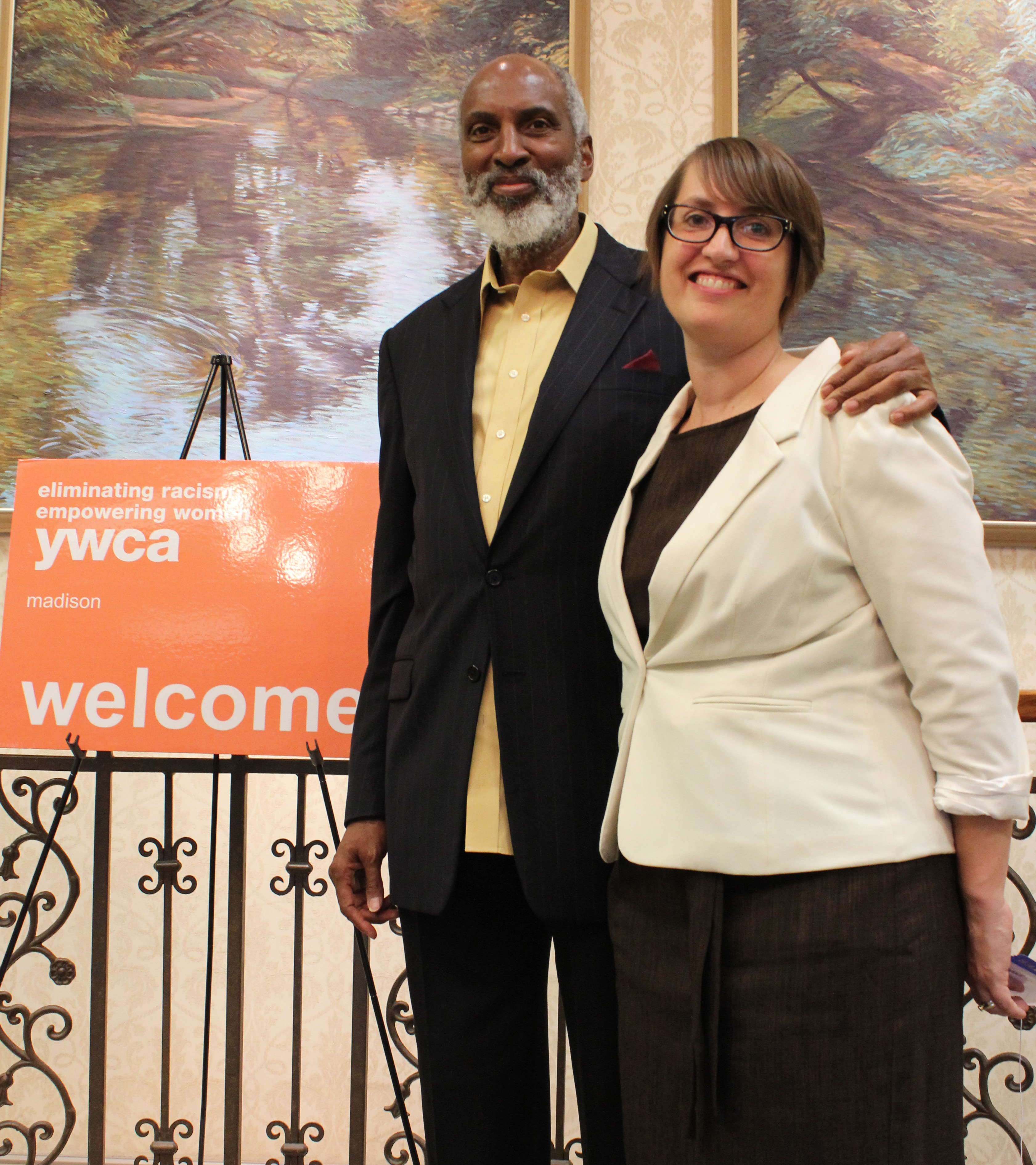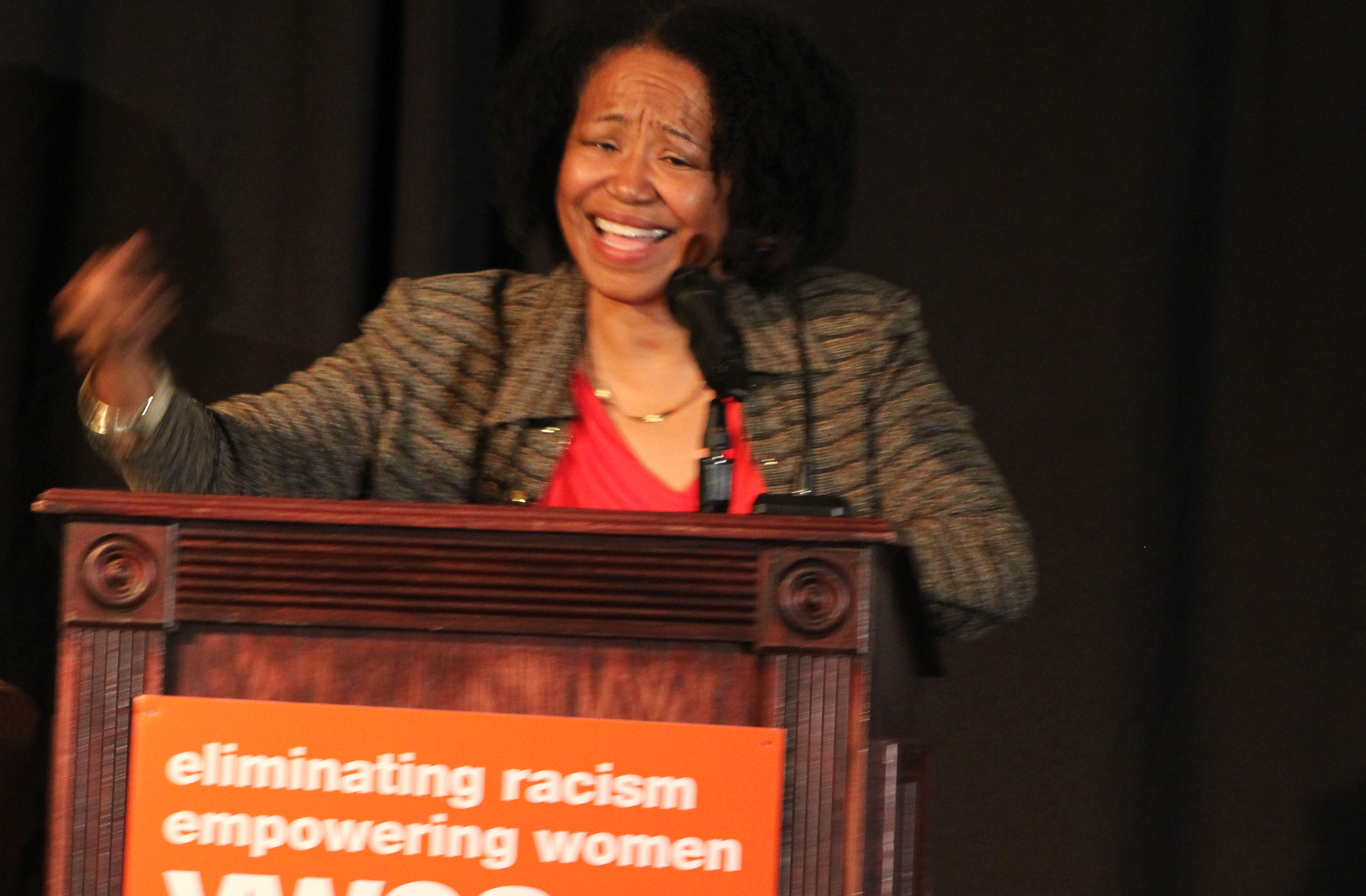 by Rasheed Shabazz | October 7, 2014
by Rasheed Shabazz | October 7, 2014
MADISON, Wis. – Over 500 people attended the 13th YWCA Madison’s Racial Justice Summit on October 2-3 in Wisconsin’s capital city. The two-day event brought together community advocates, nonprofit and government employees, as well as national leaders, to develop and share strategies to eliminate barriers to a fair and inclusive society.
Madison and Dane County might seem like an unusual place for such a summit to some. The city, county and state’s population is predominantly white, although both African American and Latino populations are growing. Madison is home of the state’s capital and the University of Wisconsin-Madison and is the heart of the progressive politics in the Badger State. (Not to mention the “Wisconsin Idea.”)
Yet demographics and reputation may mask inequalities.
Implicit Bias, “Othering” and “Belonging”
“Some of the cities with the worst racial disparities are the most liberal cities,” john powell said during the summit’s keynote speech. powell, director of the Haas Institute for a Fair and Inclusive Society, described living in San Francisco, a city with a progressive reputation but a legacy of racial discrimination towards African Americans.
powell explained implicit bias, the attitudes or stereotypes that reside deep within the human subconscious. Implicit bias impacts what and how people understand, their actions and decisions, usually leading people to favor groups they are apart of (ingroups), and often leading to less favorable attitudes towards others, or outgroups.

In America, race has been a central category and some groups “belonging,” leading to the “othering” of nonwhite groups, powell said. Once groups and persons are defined as being different, they are not considered as being worthy of concern or empathy. This bias becomes embedded within institutions and structures. This systematic social exclusion and inequality is “structural marginalization.”
Othering has become systemic and often people are aware of how they can reinforce a structure. With increased inequality and racial anxiety, often times, many find it difficult talking about these challenges.
Despite the difficulty of bringing these systemic issues to the forefront, it is critical to tell stories of structural barriers and successes of eliminating them.
“Until we address unconscious bias, the structures will reform themselves into the same systems,” said Gail Christopher, vice-president of the W.G. Kellogg Foundation. Christopher’s speech focused on the private sector and the business case for racial equity.
Wisconsin’s Race to Equity
Last fall, the Wisconsin Council on Children and families (WCCF) found heavy racial disparities in Dane County, according to their ‘Race to Equity’ report (PDF). African Americans, although just 6.5 percent of the population, were more likely to be unemployed, live in poverty and less likely to graduate on time.
Rather than blame individuals for these disparities and others, the two initiatives were launched in the fall of 2013. WCCF launched Race to Equity, a project focused on reducing racial disparities health, education, employment and criminal justice throughout the county.
 The City of Madison established the Racial Equity and Social Justice Initiative (RESJI) to eliminate inequities in city government. That initiative has three strategies: equity in city policies and budgets, operations and the community at large.
The City of Madison established the Racial Equity and Social Justice Initiative (RESJI) to eliminate inequities in city government. That initiative has three strategies: equity in city policies and budgets, operations and the community at large.
Further justification for racial justice work came this past spring. In April, a report by the Annie E. Casey Foundation listed Wisconsin as the worst state for Black children. The report considered 12 factors, like educational access and socioeconomic status, and found the state had the highest disparities among white and children of color.
Following the recent reports, this year’s summit celebrated the progress made, and urged that further work needed to be done.
“Since the (Casey) report, there is now city buy-in, county buy-in and more nonprofit buy-in and partnering with those other entities to address the disparities,” Colleen Butler, racial justice director for YWCA Madison, told Madison’s Capital Times. Since its inception, the YWCA has focused on “Eliminating Racism” and the Madison organization has hosted the summit for nearly a decade and a half. “I am cautiously optimistic.”
 At the 2013 racial justice summit, the WCCF released the Race to Equity report on disparities in Dane County. This year, the summit coincided with the release of the Race to Equity Tool Kit. The “Toolkit for Conversation” features modules for school, faith and community organizations to discuss the data in last year’s report and take action to narrow racial disparities.
At the 2013 racial justice summit, the WCCF released the Race to Equity report on disparities in Dane County. This year, the summit coincided with the release of the Race to Equity Tool Kit. The “Toolkit for Conversation” features modules for school, faith and community organizations to discuss the data in last year’s report and take action to narrow racial disparities.
Regional and National Equity
As inequality continues to rise, cities and regions are taking action. Madison’s initiatives to form a local and regional network focused on equity reflects national efforts towards justice. Madison is one of the first cities to join the Haas Institute’s Governmental Alliance on Racial Equity. A number of stakeholders from the Madison area attended the Regional Convening on Racial Equity in Minneapolis this past August. Julie Nelson, director of the Governmental Alliance, participated in a closing plenary at the Racial Justice Summit, along with Glenn Harris of the Center for Social Inclusion and Sonali S. Balajee, senior policy advisory on the Equity and Empowerment Lens for Multnomah County.
The summit focused on systems, opposed to individual biases that prevent all groups from equally accessing opportunities and outcomes.
powell encouraged attendees to focus on structures and not individual actors. When raising issues of structural marginalization, or barriers privilege some groups and burden others, he encouraged people not to be defensive. And for those raising the concern, to focus on the structures and systems. “Be hard on structures, soft on people,” powell said.

Photos: Top right, john powell gives keynote speech; attendees during White Privilege workshop by Eddie Moore; Melissa Gombar discusses City of Madison's Racial Equity and Justice Initiative; john powell and Colleen Butler, racial justice director; and Gail Christoper, vice-president of the W.G. Kellogg Foundation. Images by Rasheed Shabazz. More photos from Umoja Magazine.
Download the Race to Equity report and toolkit.




